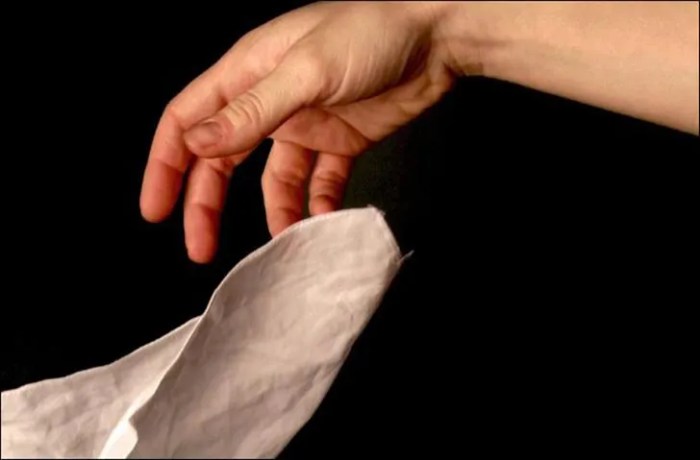Othello quotes about the handkerchief provide a profound exploration of love, betrayal, and jealousy. This pivotal symbol in Shakespeare’s tragedy weaves a complex tapestry, shaping the characters’ destinies and driving the play’s dramatic arc.
The handkerchief, a seemingly innocuous object, becomes a catalyst for Othello’s descent into madness and the tragic downfall of Desdemona. Through Iago’s manipulation and Othello’s misplaced trust, the handkerchief transforms from a cherished token of love into a symbol of betrayal and doubt.
Symbolism of the Handkerchief: Othello Quotes About The Handkerchief

The handkerchief in Othello serves as a potent symbol with multifaceted significance. It represents love, betrayal, and reputation.
As a symbol of love, the handkerchief is a cherished gift from Desdemona to Othello. Its loss devastates Othello, symbolizing the loss of his love and trust.
The handkerchief also represents betrayal. Iago manipulates the handkerchief to make Othello believe that Desdemona has been unfaithful, leading to Othello’s tragic downfall.
Finally, the handkerchief symbolizes reputation. In Elizabethan England, handkerchiefs were associated with purity and chastity. Desdemona’s loss of the handkerchief thus tarnishes her reputation and sets in motion the events that lead to her demise.
Iago’s Manipulation of the Handkerchief, Othello quotes about the handkerchief
Iago uses the handkerchief to manipulate Othello and Desdemona in several ways. He first steals the handkerchief from Desdemona’s chambermaid, Emilia, and plants it in Cassio’s room.
When Othello discovers the handkerchief in Cassio’s possession, he is convinced that Desdemona has been unfaithful. This leads to Othello’s descent into jealousy and violence.
Iago’s manipulation of the handkerchief is a masterstroke of deception. He uses it to destroy the trust between Othello and Desdemona, ultimately leading to their tragic deaths.
Othello’s Reaction to the Handkerchief
Othello’s reaction to the loss of the handkerchief is intense and emotional. He becomes consumed by jealousy and suspicion, and his behavior becomes increasingly erratic.
The handkerchief becomes a catalyst for Othello’s descent into violence. He strangles Desdemona in a fit of rage, believing that she has betrayed him.
Othello’s reaction to the handkerchief is a tragic example of how jealousy can consume a person and lead to destructive consequences.
The Handkerchief as a Plot Device
The handkerchief plays a pivotal role in advancing the plot of the play. Its loss and recovery create tension and suspense.
The handkerchief is first introduced in Act III, Scene III, when Desdemona gives it to Othello. It is then stolen by Iago and planted in Cassio’s room.
Othello discovers the handkerchief in Cassio’s possession in Act IV, Scene I. This leads to a confrontation between Othello and Desdemona, and ultimately to Othello’s murder of Desdemona.
The handkerchief is a key piece of evidence in the play. It is used to prove Desdemona’s innocence after her death, and it helps to expose Iago’s treachery.
Cultural and Historical Context
The handkerchief has cultural and historical significance in Elizabethan England. It was a common accessory for both men and women, and it was often used as a symbol of love, courtship, and marriage.
Handkerchiefs were also used to signify social status. A fine handkerchief was a sign of wealth and refinement.
In Othello, the handkerchief is a powerful symbol that reflects the social and cultural norms of Elizabethan England.
Quotations and Analysis
The handkerchief is referenced several times throughout the play. Here are a few significant quotes:
“That handkerchief—Did an Egyptian to my mother give it? / She was a charmer, and could almost read / The thoughts of people.” (Othello, Act III, Scene IV)
This quote reveals that the handkerchief was a gift from Othello’s mother. It is a cherished object that holds sentimental value for Othello.
“O cursed handkerchief! / What mischief hast thou done?” (Othello, Act IV, Scene I)
This quote expresses Othello’s anguish and despair after he discovers the handkerchief in Cassio’s possession. He realizes that the handkerchief has been used to deceive him.
“A guiltless death I die.” (Desdemona, Act V, Scene II)
This quote is spoken by Desdemona before she is murdered by Othello. She proclaims her innocence, even though she knows that Othello believes she has been unfaithful.
FAQ Insights
What is the significance of the handkerchief in Othello?
The handkerchief is a symbol of love, betrayal, and reputation. It is a gift from Desdemona to Othello, and its loss and recovery drive the plot of the play.
How does Iago use the handkerchief to manipulate Othello?
Iago plants the handkerchief in Cassio’s room, leading Othello to believe that Desdemona has been unfaithful. This manipulation fuels Othello’s jealousy and ultimately leads to Desdemona’s death.
What is Othello’s reaction to the loss of the handkerchief?
Othello becomes consumed by jealousy and suspicion. He believes that Desdemona has been unfaithful and plots her murder.

